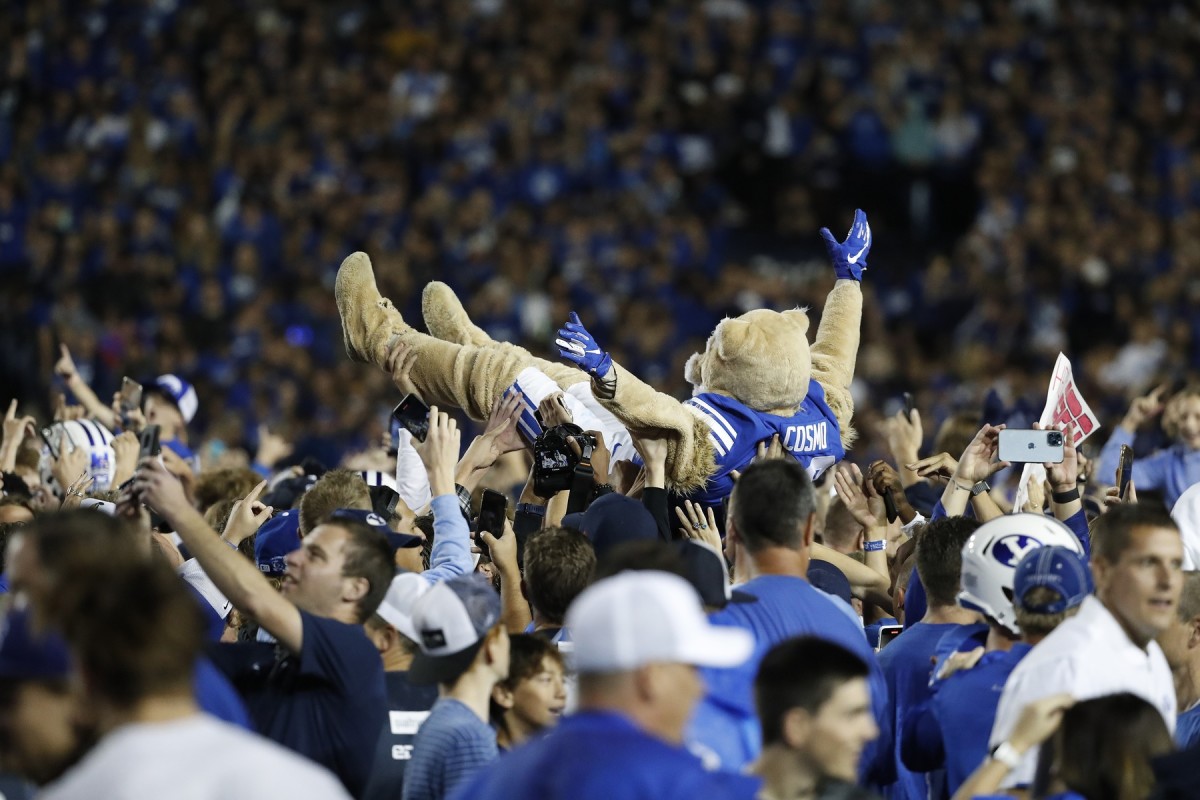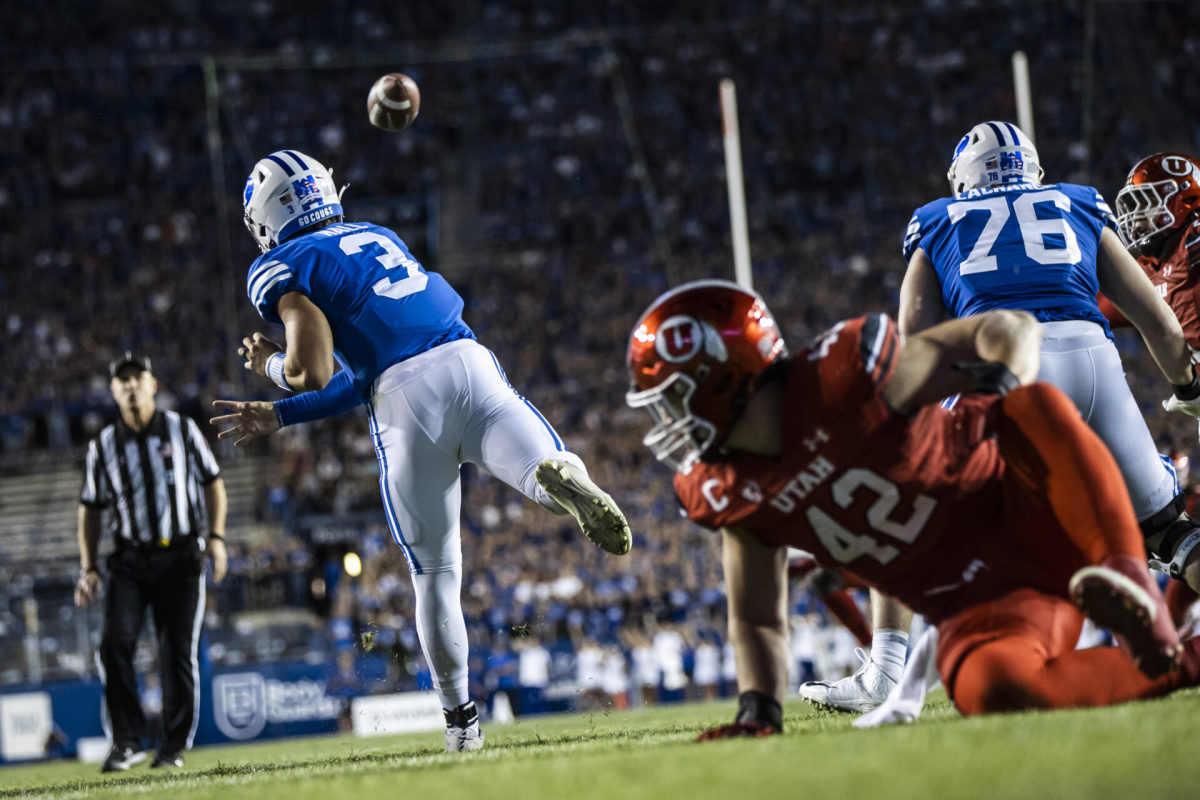Should BYU fans want Utah to join the Big 12?
The demise of the Pac-12 appears to be upon us. Arizona appears to be on its way to join Colorado the BIG 12 while the Big Ten is looking for real estate in the Pacific Northwest. That leaves the remaining Pac-12 schools on rather shaky ground. To the delight of BYU fans everywhere, Utah is among those universities that find themselves treading water as the Big 12 lifeboat floats by looking for survivors. The question is, should BYU fans want Utah to come aboard?
The Case for Utah
In a vacuum, Utah should be a lock to receive an offer to the Big 12. Utah is perennial top 20 team, a back-to-back Power Five champion, a geographical neighbor, and an AAU member. If we swapped out the Drum & Feather for virtually any other logo, we would welcome them to the fold with open arms. Every Big 12 fan would add a school like Washington given the opportunity, and whether we want to admit it or not, Utah has been a better program than Washington for a half decade. Now couple that value with rekindling one of the greatest rivalries in all of college football.
No matter how conference lines are redrawn, rivalries are still the life blood of the sport. Of games featuring two Power Five schools (plus the service academies), rivalry games drew 1.5 million more viewers on average than non-rivalry match ups. Michigan and Ohio State drew 17.1 million viewers. Army vs Navy drew over 6 million. Even non-conference rivalries like the Backyard Brawl between unranked West Virginia and Pitt drew 3.5 million viewers. America loves these games.
Several people have retweeted this from a year ago.
— John Ourand (@Ourand_Puck) August 3, 2023
It gives a good breakdown of how TV networks view college sports.
Rivalries > Market size. https://t.co/KkvODE2mC2
The Holy War is an elite rivalry. Athlon Sports ranked it as the 14th best rivalry in the country, one spot ahead of USC and UCLA. This reputation was earned despite the game never being played while both members belonged to a Power Five conference. Adding Utah adds what will be unequivocally the best rivalry in the new Big 12 and arguably the most valuable annual conference meeting to networks.
The Holy War averaged 1.5 million viewers during the independence era despite being an otherwise meaningless nonconference game. Four of the last six matchups between BYU and Utah were featured on mainline ESPN or FOX, a trend that will almost certainly continue once the game carries power conference implications.
We need to admit it. BYU adds value to the Big 12. Utah adds value to the Big 12. Adding both together is a no brainer, especially if the goal is to bring interest and eyeballs to the conference.

The Case against Utah
There is no question about it, BYU benefits from Utah staying in a watered-down Pac-8(?) that more closely resembles the Mountain West than the old Pac-12. BYU benefits from Utah making $15 million less per year while playing between episodes of Severance and Ted Lasso on AppleTV. In no other area would these benefits be felt more acutely than recruiting.
The last time BYU and Utah were conference mates, the programs were relatively equal in terms of talent. Once Utah bolted for the Pac-12, they became the beneficiaries of a massive recruiting advantage over BYU and have out recruited them ever since. On average, Utah’s recruiting classes have ranked 30 spots higher than BYU’s since joining the Pac-12. BYU swapping places with Utah at the autonomy table enables BYU to close that talent gap quicker.
The resource gap closes on day one and almost certainly swings swiftly in BYU's favor if Utah is left out of the Big 12. The Big 12’s media deal is worth around $12 million more than the PAC-12s reported offer from Apple. The distance between the two conferences will only get wider once CFP revenue and NCAA basketball tournament units are factored in.
Such a financial advantage means that BYU will be able to improve their facilities, compensate their coaches, and expand their recruiting budgets all while Utah would be forced to scale back. Would a coach like Jay Hill leave to be the head coach at Utah once Kyle Whittingham retires if it means a pay cut and a step down in competition? Who knows, but more resources makes that decision harder.

There are risks to the conference as well. Utah leadership have been vocal about their desire to remain in the Pac-12. Their fans have been vocal about their distaste for the Big 12 and its not-so-affectionate "Truck Stop Conference" nickname. There is risk to adding universities that do not align with the vision of the conference. There is bigger risk to adding more presidents to the Big 12 board that hired and enabled leadership that led them to irrelevance and destruction. The Big 12's greatest strength is its unified members. Adding any schools that do not fall in line with that unity puts the conference at risk.
Of course, there is the pettiness aspect to this as well. BYU fans don’t just want Utah’s beloved Pac-12 to die. They want Utah to suffer as they have suffered. It wasn’t enough that Utah left BYU behind for a seat at the proverbial “big boy table.” Utah’s president also felt the need to torpedo BYU’s contingency plan by leaking to the Mountain West BYU’s plans to form a football scheduling alliance with the old WAC, who would also be the new home for BYU's olympic sports. The leak resulted in the virtual death of the WAC and left BYU scrambling to find a new home for the rest of its athletic department.
Watching Utah be on the verge of everything they ever wanted, only to be left in the cold while BYU ascends to a power conference would be the ultimate poetic justice. Basking in the glow of the smoldering embers of their most hated rival’s future might be reason enough to let the Utes drift into obscurity. And if Utah doesn’t like that outcome? Hey, they can always try independence.
BYU Wins
Perhaps the best part of all of this for BYU fans is no matter what happens, BYU benefits. Either they get a head start on supplanting their rival as the premiere program in the state, or they get to fight the Holy War in the way God intended while on equal footing. As funny as it would be to watch Utah suffer the same fate BYU did more than a decade ago, Utah as a fellow conference member is nothing to fear or run from. After all, since the WAC was founded, BYU is 29-20 against the "Team Up North" when the two were on a level playing field. The beauty of it all is this: no matter what happens to Utah, BYU’s is safely home where they belong.
UPDATE: 8/4/2023 11:37 AM
Things don't move fast until they do in realignment. Just this morning, the Pac-12 was expected to sign a media deal and grant of rights. Just a few hours later, Oregon and Washington are reportedly headed to the Big Ten. This move fires the kill shot to the Pac-12 and, in my opinion, changes the calculus of how the Big 12 should approach its next move.
As of yesterday afternoon, the goal was for the Big 12 to cripple the Pac-12 and assert themselves as the third conference in the autonomy pecking order. The Big Ten did that piece for them. Now the Big 12 can afford to be a lot more selective in how they choose to approach expansion.
An additional piece of news that flew under the radar this morning is that Florida State is investigating raising private equity funds with JP Morgan Chase, potentially to finance their departure from the ACC. How does this affect the Big 12? The ACC's destabilization provides more expansion opportunities with programs that are arguably better than what the Big 12 can find out west.
ESPN's pro-rata clause in the Big 12 deal is reportedly only good for up to 16 teams, while FOX has only agreed to cover up to 14. Does it behoove the Big 12 to only add one additional PAC-12 school until the dust settles out east? I would argue for yes.
Now who should the Big 12 add out west? Arizona is the obvious choice. The Big 12 knows that solidifying its place as the nations premiere college basketball conference is their path to long-term viability. Arizona does that while not diluting the conference's reputation in football. Plus, the Big 12 has already voted to add the Wildcats pending a vote by the Arizona board of regents.
Where does this leave Utah? As mentioned above, Utah is a no-brainer if the goal is to improve the football portfolio while also killing the Pac-12. Now that the Pac-12 is already gone, does adding Utah vault the Big 12's football status enough to lose out on the chance to add a Miami in football or a Duke in basketball? That's a tougher sell.
The Big 12's long-term future is in being the top basketball conference and third football conference, and there are too many schools who are good at both potentially available out East to justify quickly adding three more schools who weren't worth putting on television at the Big 12's asking price. The Big 12 can afford to be patient here. There is no sense in adding two schools in ASU and Utah whose presidents have tried every possible detour to avoid joining the Big 12. At the very least, it's not worth adding them at full shares, especially if FOX isn't willing to pay the difference.
The Big 12 has all the leverage now, and I personally don't believe they can make a wrong choice. If they add Utah, ASU, and Arizona, the conference will survive and be better for it. If they add Arizona and wait for the dust to settle for a few years, Utah and ASU will still likely be there when the next deal comes. The best news is the Big 12 leadership has a track record of doing what is best for the conference.
